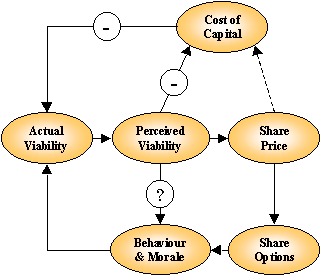
 |
BSkyBveryard projects > business organization > case studies > bskyb |
| focus | contents | links |
| In February 2004, students following our
course in Business and Organizations were required to submit an essay
on the viability of BSkyB as a business operation.
BSkyB (Sky) appears to be in a dominant position as a provider of satellite television channels in the UK. You should choose at least two different perspectives from which to understand ways in which the business might lose its viability in the future. This page includes the advice given to students before submitting the assignment as well as the feedback given afterwards. It also contains some more recent material. |
Suggested Angles | BSkyB website |
 |
Analysing BSkyB - Suggested Anglesveryard projects > business organization > case studies > bskyb > angles |
 |
Analysing BSkyB - Evaluationveryard projects > business organization > case studies > bskyb > evaluation |
At the other extreme, some essays were deluged in facts, but with no analysis to make sense of the facts. We got biographical details of the Murdoch family, and customer anecdotes of failed set-top boxes – possibly very interesting if you could find a way of linking it to the main topic of the essay (corporate viability), but otherwise a waste of space.
Some essays seemed to be composed entirely from extended quotes from journalistic sources, with no commentary or other material. Some essays relied too heavily on the Sky website, without balancing it against independent sources.
Some students fell into the trap of asserting something definite in one paragraph, and then asserting the exact opposite in the next paragraph. Better to adopt more cautious turns of phrase – "A tends to increase the chances of B."
Essays that used different sources of information at different times produced different facts. For example: different P/E ratios, different estimates for Tony Ball’s payoff.
Any sources – even respectable ones like the Financial Times – can get it wrong sometimes. Ideally, each fact or opinion should be referenced to its source. (Most students simply put a list of sources at the end.)
 |
BSkyB - Viability - Perceived and Actualveryard projects > business organization > case studies > bskyb > viability |

| Viability (html)
Viability Course Notes (pdf) |
| High expectations of Sky’s future profits | High demand for Sky shares | High share price | High P/E ratio |
A high P/E ratio is a sign or indicator of high expectations. It is not generally a cause of high expectations in the company.
Generally, as share prices rise, fewer investors are willing to buy,
and more investors are willing to sell. Thus share price increases are
normally self-limiting. (There are some apparent exceptions to this, largely
based on the behaviour of speculators, especially those who practise so-called
momentum investing, which involves betting on the continuation of recent
price movements. However, this is merely based on a prediction of short-term
share price movements and does not represent a judgement about the underlying
viability of the company.)
| Price/Earnings Ratio |
 |
BSkyB - Framing the Analysisveryard projects > business organization > case studies > bskyb > frame |
When analysing the viability and competitive position of BSkyB, it may be useful to separate these two aspects. The competitors for content may be collaborators on delivery, and vice versa. Technological progress may affect delivery but has no direct impact on content, while the exclusive deals with football and other sports is about content rather than delivery.
Of course, BSkyB tries to use its power in delivery to enhance its position in content, and vice versa. Regulators may be expected to oppose this power. These complex games are very interesting in relation to the long-term viability of BSkyB – but difficult to analyse.
To what extent does BSkyB’s viability depend on dominating both delivery and content? Many students focused on challenges to the delivery mechanism, or challenges to the exclusive sports deals, without asking how these might be coupled or uncoupled.
![]()
 |
veryard projects > business organization > case studies > bskyb |
Copyright © 2004 Veryard Projects Ltd http://www.veryard.com/companies/bskyb.htm |